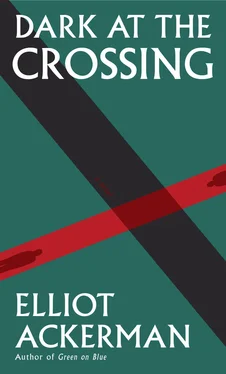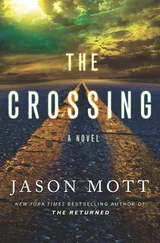Inside the guard booth, two Turkish gendarmes watched television. They sat side by side, reclined in their cheap leather office chairs, smoking Gauloises and laughing at some show. Haris knocked gently on the window. They didn’t notice him. He knocked harder, pounding the glass. The gendarmes swung around. The pair were nearly indistinguishable. Both were young, but just old enough so a band of fat rimmed their stomachs. Smeared across their cheeks was stubble. It’d likely grown over their two-to-three-day shift. It appeared as though they lived in the booth.
Haris pressed his U.S. passport against the glass.
The pair slowly stood. Each grabbed a blue tunic from a coatrack in the corner, buttoning its front. The first gendarme, who was a head taller than the other, came to the window. He keyed an intercom, speaking quickly in Turkish.
Not understanding, Haris said nothing.
The tall gendarme slumped his shoulders and sighed. “Yok English.”
“Arabe?” asked Haris.
The shorter of the two pushed past his friend. “Shwe, shwe,” he said, examining Haris. “The border is closed,” he added in broken Arabic.
“For how long?”
The shorter gendarme gazed toward Azaz, where a phalanx of smoke still stabbed at the horizon. “Long time.”
Haris stepped away from the glass.
Saladin1984 had assured him that crossing the border would be easy, that the Turks were no friends of Bashar al-Assad, that they welcomed foreigners who wanted to fight against the Syrian regime. Haris checked his phone. No new messages.
He tapped on the glass again. The taller gendarme nudged the shorter one, who stood heavily and approached the intercom. “What else?” he asked.
“I’m not just American,” said Haris.
“I see that,” said the gendarme. “You speak very good Arabic.”
“I’m from Iraq,” added Haris. “I only recently became an American.”
The gendarme smiled.
Haris felt a quick surge of hope in his chest, like a perfect knot cinched tight.
“You managed to leave Iraq and get all the way to America?” asked the gendarme.
Haris nodded.
“Arriving there, you managed to get citizenship for yourself?”
Again Haris nodded.
“And now you want to cross into Syria?”
Haris said nothing. He looked out toward Azaz.
The short gendarme glanced at his partner, who sat in front of the television, entranced by his program. His eyes returned to Haris’s. “You’ve come here to cross the border and die with them,” he said. The gendarme’s smile from before, the one Haris had thought was sympathy, dissolved. It hadn’t been sympathy. It’d been pity. “You’re a damn fool, and I won’t help one fool die with other fools. The border is closed.”
As the gendarme went back to his seat, his friend, who hadn’t been listening, began to laugh violently, slapping his knee and explaining the punch line to some joke on the television. A smile returned to the short gendarme’s face, and soon he was laughing too.
A large tent sat in the wet field. It skirted the gravel parking lot where the cabdriver had dropped Haris off. Wired to the tent’s center pole was a speaker. A muezzin called the midday prayer. The first notes of his voice started low, mixing with static. Then his voice rose, becoming smooth. Its call gathered the refugees who waited on the roadside or in the café made from the shipping container. They trickled into the tent’s cavernous gallery. Women brought their children, dragging sons and daughters by the hand. Men spoke quietly, finishing their conversations as they filed into the makeshift mosque.
Haris shouldered his pack and walked against the crowd, toward the café. He was hungry. Among the empty plastic chairs and tables, he sat alone, taking out his map, pondering it like a crossword, one beyond his abilities. The laughter of the gendarmes had stirred a surge of embarrassment, which now settled warmly in his stomach like a cheap, stiff drink. The sensation reminded Haris of his first days in America and the awkwardness he had felt when asked the simplest of questions, like where he was from. When he would say “Iraq,” the asker would always respond with a variation of either “What should we be doing over there?” or “What’s brought you here?” Haris interpreted the former response as one of pity and the latter as one of suspicion.
Could he expect more than pity and suspicion from his new countrymen? Could he expect them to say “I’ve always wanted to see the gold dome of Karbala”? So to integrate into his new nation, he claimed origins from another: he would be Greek. How Samia laughed when she heard him scatter this lie — to a convenience store clerk, to a bus driver, to the salesgirl who sold Samia her college textbooks. With each of her laughs Haris felt a desire to abandon his sister — at the store, on the bus or without tuition at college — so she might feel the vulnerability he shielded her from. Yet he never would. Instead, he’d gently cuff his hand around her wrist and tell her to laugh all she wanted, that if she was happy nothing could bother him. He enrolled Samia in college. He bought her new clothes for the first day. He did all of this though he could afford none of it.
Staving off loneliness at night, he would occasionally go to a bar. Though he had little taste for alcohol, he remembered when he had worked as an interpreter and the stories told to him by American soldiers — raucous nights of romantic heroics triggered by little more than them walking into a bar. This was never his experience, except for once. He had waited until Samia fell asleep in their apartment, a studio in Dearborn donated by a local Christian charity, complete with a foldout couch, and then he walked, for he didn’t have a car, half an hour through the darkness to the lobby of a hotel that had a small lounge sandwiched between reception and its revolving doors. With a week’s worth of spare change, he ordered a cocktail poured in a plastic cup. He sat for a while, watching the traffic trickle on and off the interstate’s nearby ramp. He finished his drink, and as he fingered loose a Maraschino cherry from among the melting ice cubes, the elevator bell rang.
A woman in a velour sweat suit walked through reception, past Haris, and stepped outside for a cigarette. Through the window, Haris felt her eyes on him. When he glanced up, she stubbed out her cigarette and spun back through the revolving door. She asked Haris if he had a piece of gum, which he didn’t. Then she sat next to him, ordering drinks for them both and saying very little. Her silence put Haris on edge so he began to speak about himself. The woman played with the zipper on her grape-purple sweat top, her small breasts barely cupping the white T-shirt beneath. Zip up, zip down. Zip up, zip down. Haris lost interest in his story. When at her suggestion they stepped outside to share a cigarette, her lipstick left a heavy red smudge on its filter. She was older, stalled along some bitter plateau. She wore her hair in two tragic pigtails. After inviting Haris to her room for another cocktail, she said nothing in the elevator and undressed just past her door. Naked, she rested her hands proudly on her hips, challenging Haris to undress as well. Soon he stood in a pile of his clothes. Then she glanced down. “I didn’t think Greek boys got snipped.” The familiar dread in his stomach returned, but before he could concoct some reply, she pressed herself against him. “Baby, I don’t care where you’re from.”
Being from the United States and Iraq had not helped him with the gendarmes, and sitting in the café Haris tried to figure a way past them. From the serving window, a side of the shipping container that had been welded open and hinged to create a counter, the proprietor with the mustache brought him some hot tea. In the cold air, the glass sweated condensation into its saucer.
Читать дальше












